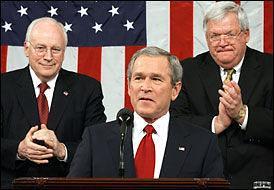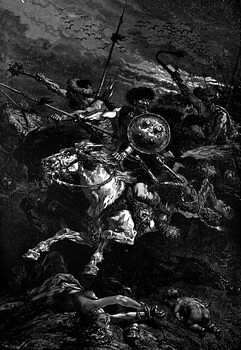 In Paul Krugman's latest column this morning, he outlines some examples of Bush's deliberate seeding of important agencies with the kinds of destructive appointments guaranteed to bring those agencies down. Using FEMA as a starting place, he ticks them off, with examples: the EPA, FDA, CPB, and then on to the Treasury Department itself, and Homeland Security, two agencies you'd think even Bush would have a stake in preserving. He sums up at the end:
In Paul Krugman's latest column this morning, he outlines some examples of Bush's deliberate seeding of important agencies with the kinds of destructive appointments guaranteed to bring those agencies down. Using FEMA as a starting place, he ticks them off, with examples: the EPA, FDA, CPB, and then on to the Treasury Department itself, and Homeland Security, two agencies you'd think even Bush would have a stake in preserving. He sums up at the end:"The point is that Katrina should serve as a wakeup call, not just about FEMA, but about the executive branch as a whole. Everything I know suggests that it's in a sorry state - that an administration which doesn't treat governing seriously has created two, three, many FEMA's."Doesn't treat governing seriously. That's the crux of it. Conservative satirist P.J. O'Rourke once cracked, "Republicans say, 'Government doesn't work. Elect us and we'll prove it.'" I would take the opposing view, and suggest that Bush has treated governing very seriously. Seriously in the sense that he is serious about destroying it as we have always known it.
 And now his clusterfuck excuse for an infrastructure has made the point for O'Rourke and Krugman and me and many others, among them, William Greider. In a devastating article, "Rolling Back the 20th Century", written for The Nation back in April of 2003, Grieder described the long-term plans of the extreme right, and their yearning for the good old days of the McKinley era, the Gilded Age of robber barons, non-existent health and safety regs, and near-slave labor. Here he is, laying out the basic plan:
And now his clusterfuck excuse for an infrastructure has made the point for O'Rourke and Krugman and me and many others, among them, William Greider. In a devastating article, "Rolling Back the 20th Century", written for The Nation back in April of 2003, Grieder described the long-term plans of the extreme right, and their yearning for the good old days of the McKinley era, the Gilded Age of robber barons, non-existent health and safety regs, and near-slave labor. Here he is, laying out the basic plan:"§ Eliminate federal taxation of private capital, as the essential predicate for dismantling the progressive income tax. This will require a series of reform measures (one of them, repeal of the estate tax, already accomplished). Bush has proposed several others: elimination of the tax on stock dividends and establishment of new tax-sheltered personal savings accounts for the growing "investor class." Congress appears unwilling to swallow these, at least this year, but their introduction advances the education-agitation process. Future revenue would be harvested from a single-rate flat tax on wages or, better still, a stiff sales tax on consumption. Either way, labor gets taxed, but not capital. The 2003 Economic Report of the President, prepared by the Council of Economic Advisers, offers a primer on the advantages of a consumption tax and how it might work. Narrowing the tax base naturally encourages smaller government.In every instance outlined here, Bush has moved to make Grieder's nightmare a reality, and he has only just begun.
§ Gradually phase out the pension-fund retirement system as we know it, starting with Social Security privatization but moving eventually to breaking up the other large pools of retirement savings, even huge public-employee funds, and converting them into individualized accounts. Individuals will be rewarded for taking personal responsibility for their retirement with proposed "lifetime savings" accounts where capital is stored, forever tax-exempt. Unlike IRAs, which provide a tax deduction for contributions, wages are taxed upfront but permanently tax-sheltered when deposited as "lifetime" capital savings, including when the money is withdrawn and spent. Thus this new format inevitably threatens the present system, in which employers get a tax deduction for financing pension funds for their workers. The new alternative should eventually lead to repeal of the corporate tax deduction and thus relieve business enterprise of any incentive to finance pensions for employees. Everyone takes care of himself.
§ Withdraw the federal government from a direct role in housing, healthcare, assistance to the poor and many other long-established social priorities, first by dispersing program management to local and state governments or private operators, then by steadily paring down the federal government's financial commitment. If states choose to kill an aid program rather than pay for it themselves, that confirms that the program will not be missed. Any slack can be taken up by the private sector, philanthropy and especially religious institutions that teach social values grounded in faith.
§ Restore churches, families and private education to a more influential role in the nation's cultural life by giving them a significant new base of income--public money. When "school choice" tuitions are fully available to families, all taxpayers will be compelled to help pay for private school systems, both secular and religious, including Catholic parochial schools. As a result, public schools will likely lose some of their financial support, but their enrollments are expected to shrink anyway, as some families opt out. Although the core of Bush's "faith-based initiative" stalled in Congress, he is advancing it through new administrative rules. The voucher strategy faces many political hurdles, but the Supreme Court is out ahead, clearing away the constitutional objections.
§ Strengthen the hand of business enterprise against burdensome regulatory obligations, especially environmental protection, by introducing voluntary goals and "market-driven" solutions. These will locate the decision-making on how much progress is achievable within corporate managements rather than enforcement agencies (an approach also championed in this year's Economic Report). Down the road, when a more aggressive right-wing majority is secured for the Supreme Court, conservatives expect to throw a permanent collar around the regulatory state by enshrining a radical new constitutional doctrine. It would require government to compensate private property owners, including businesses, for new regulations that impose costs on them or injure their profitability, a formulation sure to guarantee far fewer regulations [see Greider, "The Right and US Trade Law," October 15, 2001].
§ Smash organized labor. Though unions have lost considerable influence, they remain a major obstacle to achieving the right's vision. Public-employee unions are formidable opponents on issues like privatization and school vouchers. Even the declining industrial unions still have the resources to mobilize a meaningful counterforce in politics. Above all, the labor movement embodies the progressives' instrument of power: collective action. The mobilizations of citizens in behalf of broad social demands are inimical to the right's vision of autonomous individuals, in charge of their own affairs and acting alone. Unions may be taken down by a thousand small cuts, like stripping "homeland security" workers of union protection. They will be more gravely weakened if pension funds, an enduring locus of labor power, are privatized."
 Even now, his apologists on the right are minimizing the signifigance of the lives lost and the damage done down south, positioning Bush to arise from these ashes like the murdering phoenix he has been after every disaster his administration has overseen.
Even now, his apologists on the right are minimizing the signifigance of the lives lost and the damage done down south, positioning Bush to arise from these ashes like the murdering phoenix he has been after every disaster his administration has overseen.If you want to stop this man, if you want to fight back, it's crucial to expose this agenda at every turn, and to keep reminding people where their troubles are coming from, because we have seen how American amnesia has time and again aided these people in their short-term history rewrites.
 It's very easy for people to see their local infrastructures disappear and their schools collapse, and then blame local and state officials for it. But in truth, it was the Bushco plan all along to strip the states and municipalities of funds, layer on financial responsibilities that once belonged to the fed, add unfunded mandates to increase the burden, and then turn around and point to their own tax breaks and crow about getting government off our backs, all the while breaking the bank with the spiralling debt of those tax breaks, their ongoing wars, and the huge subsidies they handed out like candy to their already sinfully wealthy corporate buddies.
It's very easy for people to see their local infrastructures disappear and their schools collapse, and then blame local and state officials for it. But in truth, it was the Bushco plan all along to strip the states and municipalities of funds, layer on financial responsibilities that once belonged to the fed, add unfunded mandates to increase the burden, and then turn around and point to their own tax breaks and crow about getting government off our backs, all the while breaking the bank with the spiralling debt of those tax breaks, their ongoing wars, and the huge subsidies they handed out like candy to their already sinfully wealthy corporate buddies.All of which is calculated to wipe government as we once knew it off the face of the map, and render individuals powerless and ineffectual. Welcome to the Republican machine.





No comments:
Post a Comment